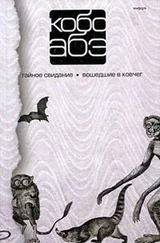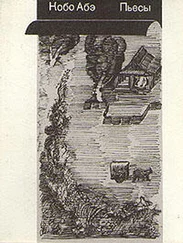Кобо Абэ - The Ark Sakura
Здесь есть возможность читать онлайн «Кобо Абэ - The Ark Sakura» весь текст электронной книги совершенно бесплатно (целиком полную версию без сокращений). В некоторых случаях можно слушать аудио, скачать через торрент в формате fb2 и присутствует краткое содержание. Год выпуска: 1988, Жанр: Современная проза, на английском языке. Описание произведения, (предисловие) а так же отзывы посетителей доступны на портале библиотеки ЛибКат.
- Название:The Ark Sakura
- Автор:
- Жанр:
- Год:1988
- ISBN:нет данных
- Рейтинг книги:3 / 5. Голосов: 1
-
Избранное:Добавить в избранное
- Отзывы:
-
Ваша оценка:
- 60
- 1
- 2
- 3
- 4
- 5
The Ark Sakura: краткое содержание, описание и аннотация
Предлагаем к чтению аннотацию, описание, краткое содержание или предисловие (зависит от того, что написал сам автор книги «The Ark Sakura»). Если вы не нашли необходимую информацию о книге — напишите в комментариях, мы постараемся отыскать её.
The Ark Sakura — читать онлайн бесплатно полную книгу (весь текст) целиком
Ниже представлен текст книги, разбитый по страницам. Система сохранения места последней прочитанной страницы, позволяет с удобством читать онлайн бесплатно книгу «The Ark Sakura», без необходимости каждый раз заново искать на чём Вы остановились. Поставьте закладку, и сможете в любой момент перейти на страницу, на которой закончили чтение.
Интервал:
Закладка:
Japanese history books tell about “moving the capital,” a ritual that took place at fixed intervals in ancient Japan. The reason for this was the same, I think — people’s sensitivity to smell. With a dense population, waste disposal eventually becomes a problem. Sewage, trash. and dead bodies.
Once, when I was a boy on a school excursion to Kyoto, somebody explained that one particular ancient classical poem from that era (when, exactly, I don’t recall) meant roughly that whenever the wind blew a certain way, it stunk to high heaven. I remember how shocked I was. But back then, of course, they didn’t bury their dead. They piled them up on the ground, say in a bamboo grove on the outskirts of town. (Maybe that explains why Kyoto is famous for its bamboo shoots to this day; I don’t know.) Anyway, it’s obvious why they would have had to move the capital periodically. People can’t win out over waste matter; at some point it takes over and gets the better of them. In foreign countries, you often come across the ruins of abandoned cities and towns. Buildings made of stone couldn’t easily be moved, so raw sewage and dead bodies accumulated, epidemics were rampant, and the cities were left to fall into ruins. Wooden structures disappear without a trace, but they might have been that much more sanitary. The only way to avoid having to move, or leave empty ruins, is to build your city around a large manhole. The ideal sewage system, in other words, is like a giant umbilical cord: the lifeline of the city of the future.
Sengoku’s first practical application of his manhole theory was to take over the disposal of aborted fetuses from local obstetricians. The plan was successful as well as clever. Previously, the only recourse had been the makeshift device of mixing the fetuses in furtively with raw waste from the fish market. This system had never appealed to those involved, and they were only too glad to wash their hands of it.
Sengoku and I quickly set up a company that we called SWAMDI, or Special Waste Matter Disposal, Inc. “What title do you want?” I asked him. “You can be president, or executive director, or secretary-general. Take your pick.”
“What will you be?” he answered. “Chairman?”
“Just plain manhole manager is good enough for me.”
“Then I’ll be secretary-general. No president or vice-president. More democratic that way, don’t you think?” he said, adding, “Are there any other members?”
“For now it’s just you and me,” I said.
“Even better,” he said. “The more people, the less each one’s share of the take.”
“The fewer faucets,” I said, “the less leaking.”
“Exactly.”
“So for the time being,” I continued, “I want there to be just one. Not that I don’t trust you — I do, but I think you’re better off not knowing too much about the manhole. Then there’s no way you could tell anybody anything. I know it seems unfriendly. ”
“No, I don’t mind,” he said cheerfully. “If anything ever happened, I’d get off lighter not knowing.”
The very unconventionality and flamboyance of this first project of ours made it difficult to attract orders. And unless you’re dealing in dead bodies or industrial waste, the disposal business pays next to nothing. Finally, in our third month, we began handling hexavalent chromium. Soon we were doing so at regular intervals, and this became our chief source of revenue. Sengoku gave spending money to his mother, who was still busy proselytizing, and talked her into letting him virtually close up the store. Sometimes, when he was in the mood, he would bake some of his prize sweet-potato cakes just for me.
That was all about a year ago. Since then everything had been going smoothly, until I ran into Inototsu in front of the Plum Blossom Sushi Shop. Sengoku and I worked together well, in a spirit of genuine friendship. Besides meeting once a week at 4 p.m. for the delivery of hexavalent chromium, we met often in a back room of his store (now closed), to drink coffee, chat, exchange last month’s magazines, and play an occasional game of chess. Sometimes we would drink a toast to the manhole. Sengoku used to declare that he had never known such a sense of fulfillment in all his life. The vague anxiety he felt was probably due to his recovery from impotence, but that, he said, smiling, was like the sense of exhilaration you get after washing your face with fine soap. Time seemed to weigh on his hands, so sometimes I had him help me with other things besides the SWAMDI work. Things like purchasing and transporting supplies for the ark: parts for air conditioners, materials for gunpowder, and so on. I realized now that I should have explained everything to him then. It wasn’t that I doubted him at all. I fully intended to give him a ticket to survival too, but I kept putting it off. My failure to include him owed solely to my own lack of decisiveness. He must have suspected something, but he never once asked anything approaching a question— either because he knew his place or because he had suffered a lot for a man his age. He had a habit of saying, “Peace is wonderful.”
“So we beat out your friend Sengoku, eh?” said the shill, upending his fourth can of beer and sucking up the last remaining froth. “He’d be mad as hell if he knew.”
“That’s why I feel guilty. I’ll have to tell him about you three, who’ve contributed nothing, and get his approval after the fact.”
“I wouldn’t trust that person Sengoku,” said the girl, leaning back and tugging at the hem of her skirt. Man-made leather hardly stretches at all, so the only effect was to accentuate the gap between her knees.
“Try to remember, Captain,” said the shill, stifling a yawn. “Was it before or after you ran into Inototsu that you began to sense the presence of an intruder?”
“How do I know?”
“But that’s the crux of it all: that’ll tell you if you can trust your secretary-general or not.”
“Why?”
“It only makes sense,” said the girl. “That man Sengoku sounds too reserved.” She covered the end of her sentence with a smile, to keep me from opening my mouth. “Are you sure he wasn’t in league with the Broom Brigade from the start?”
The question was not lacking in merit. I myself wondered at what point Sengoku had learned of Inototsu’s connection with the Broom Brigade. He certainly knew both that the hexavalent chromium came from there and that Inototsu was my biological father. If he had remained silent while knowing Inototsu to be the head of the Broom Brigade, that suggested not mere reserve but a deliberate lack of candor. Had he wanted to keep his trump card hidden until I was more open about my life in the quarry?
The insect dealer slumped from the table down onto the floor. He landed in a sitting position, eyes half open, but the angle of his neck showed he was fast asleep. Too bad — he was back in position to look up her skirt but unable to do anything about it. Now if only the shill would go to sleep too. I threw him his fifth beer.
“Shall we get ready to turn in?” I said.
“Are you serious?” The shill opened his can, peering under the table.
“That’s right — don’t you know what time it is? It’s still only five after eight.” The girl too looked under the table, pressing her cheek against the chaise longue.
Everyone but me disappeared below the surface of the table. As I kept my gaze level, I was assaulted by a wave of loneliness. Along with quiet came unrest.
“The evening is young. Shall we be setting off?” said the shill.
“Where to?” I asked.
“Cave exploring, of course. Spelunking.” He was still under the table. “What’s this in the bag next to the Styrofoam box — a sleeping bag?”
Читать дальшеИнтервал:
Закладка:
Похожие книги на «The Ark Sakura»
Представляем Вашему вниманию похожие книги на «The Ark Sakura» списком для выбора. Мы отобрали схожую по названию и смыслу литературу в надежде предоставить читателям больше вариантов отыскать новые, интересные, ещё непрочитанные произведения.
Обсуждение, отзывы о книге «The Ark Sakura» и просто собственные мнения читателей. Оставьте ваши комментарии, напишите, что Вы думаете о произведении, его смысле или главных героях. Укажите что конкретно понравилось, а что нет, и почему Вы так считаете.





